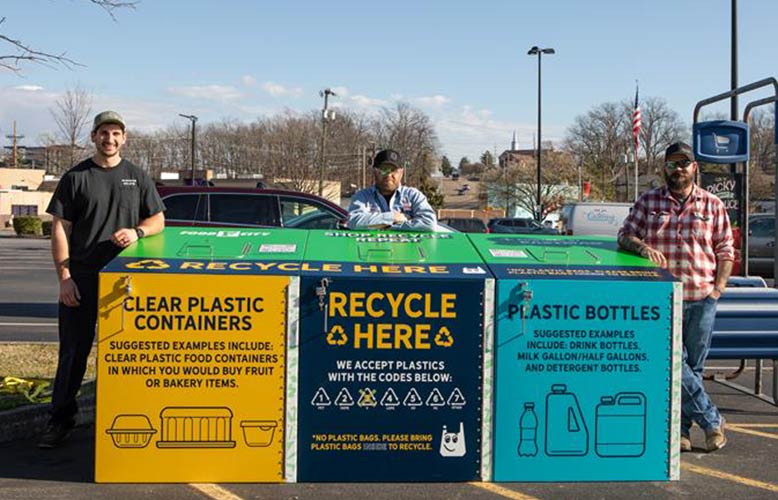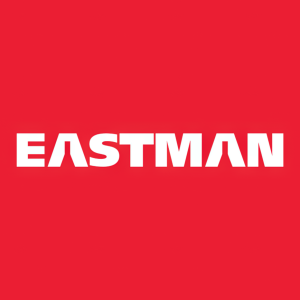Eastman and Food City Unveil New Plastics Recycling Bin in Kingsport
KINGSPORT, TN / ACCESSWIRE / March 12, 2024 / Eastman, a global specialty materials company, and Food City, a leading regional grocery retailer, unveiled the first (Eastman Road Food City) of three plastic recycling collection bins that will be located at the retailer's stores in Kingsport, Tennessee. The partnership program - Shop, Recycle, Repeat, announced last November - will enable customers to drop off their plastic waste in the area since curbside pickup is no longer available. The collected plastic will be sorted and processed by Eastman's new mixed plastics processing facility, a part of the new molecular recycling plant which is the largest material-to-material recycling facility in the world.
"We're excited to unveil the first recycling bins and are so proud that they were designed and created by talented Eastman craftspeople who work at our facility in Kingsport," said Brad Lich, Eastman executive vice president and chief commercial officer. "This partnership is an important step in our region to bring additional plastics recycling options to our community and demonstrates our shared vision for a more sustainable future, where plastic waste is seen as a valuable resource that can be transformed into new products."
The partnership is part of Eastman and Food City's commitment to advancing the circular economy and reducing the environmental impact of plastic waste. By offering convenient and accessible recycling options to drop off plastics for the public, Shop, Recycle, Repeat will help divert plastic waste from landfills or incineration to create valuable new materials that can be used in a variety of applications again and again. Eastman's molecular recycling technology breaks down plastic waste into its molecular building blocks, which are then used to create new high-performance plastics that are indistinguishable from virgin materials. This technology can recycle plastics that are typically difficult to recycle, such as colored laundry detergent bottles, clamshell fruit packaging, polyester fabrics, shampoo bottles, and much more.
"Food City is excited to partner with Eastman, a world-class company and a long-time leader in our community, to bring plastics recycling to our customers," said Steven C. Smith, Food City president and chief executive officer. "The bin at our Eastman Road location is the first of three that will be available within the next month at our Kingsport stores, and we look forward to expanding the partnership at additional Food City locations later this year. By working together, we can make a lasting impact across our region."
Shop, Recycle, Repeat is launching at three Food City stores in Kingsport and will expand to other Food City locations in the region throughout the year. Customers can drop off their plastic waste, such as water bottles, colored laundry and shampoo bottles, trays and fruit containers, among many other plastic items. Additional information about how to recycle plastic waste can be found here.
About Eastman
Founded in 1920, Eastman is a global specialty materials company that produces a broad range of products found in items people use every day. With the purpose of enhancing the quality of life in a material way, Eastman works with customers to deliver innovative products and solutions while maintaining a commitment to safety and sustainability. The company's innovation-driven growth model takes advantage of world-class technology platforms, deep customer engagement, and differentiated application development to grow its leading positions in attractive end markets such as transportation, building and construction, and consumables. As a globally inclusive and diverse company, Eastman employs approximately 14,000 people around the world and serves customers in more than 100 countries. The company had 2023 revenue of approximately
About Food City
Headquartered in Abingdon, Virginia, K-VA-T Food Stores (Food City's parent company) operates 154 retail outlets throughout southeast Kentucky, southwest Virginia, east Tennessee, North Georgia, and Alabama. Food City is well-known for its top-quality products, exceptional customer service, and extensive community involvement. The company is dedicated to its mission to "run the best store in town." For more information, visit www.foodcity.com.
Media contact
Kristin Parker
1-423-229-2526
kristin@eastman.com
Food City Communications
Tammy Baumgardner
276-623-5100
baumgardnert@foodcity.com

View additional multimedia and more ESG storytelling from Eastman on 3blmedia.com.
Contact Info:
Spokesperson: Eastman
Website: https://www.3blmedia.com/profiles/eastman
Email: info@3blmedia.com
SOURCE: Eastman
View the original press release on accesswire.com







